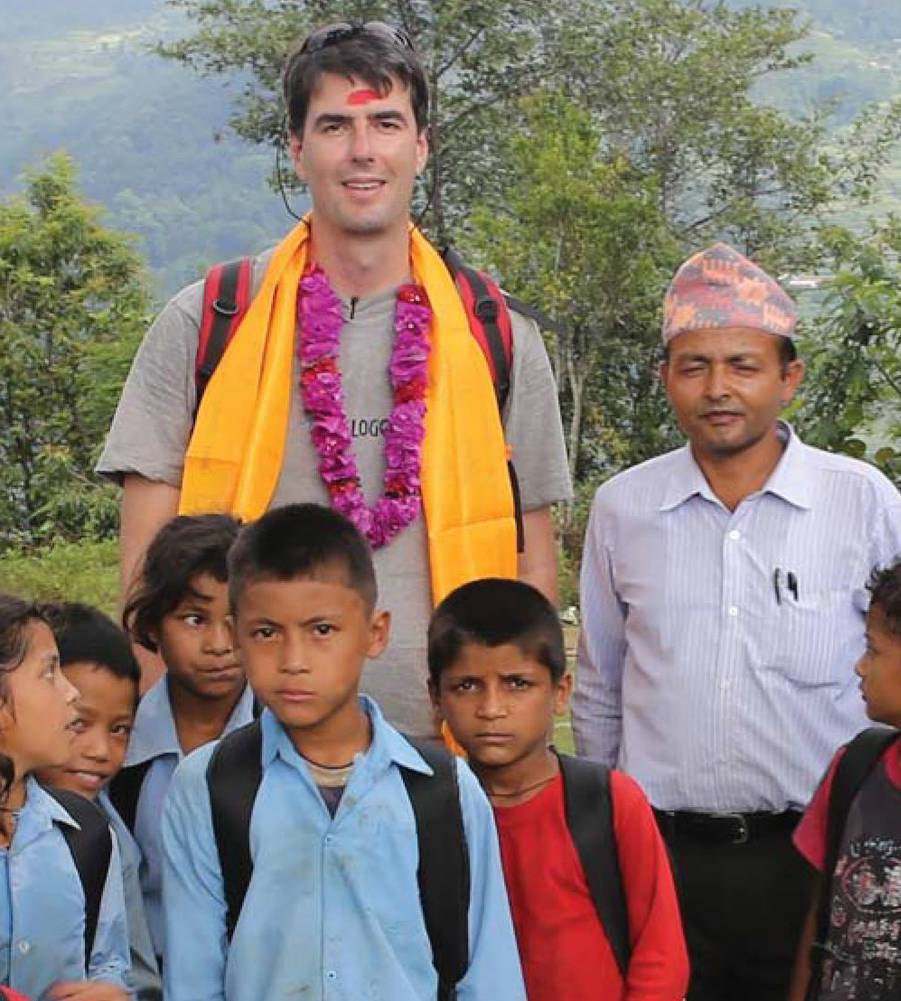The Story
In 2015, Nepal was struck by a devastating series of earthquakes that left almost 9,000 people dead and three million homeless. About 50,000 classrooms were either destroyed or damaged, putting the aspirations of a generation of children at serious risk.
Within a month after the earthquake, Mark Pinoli, the CEO of Australian charity the Logged On Foundation, went to Nepal to help seven schools affected by the disaster. During his journey, Mark filmed the impact the disaster has had on rural communities and the struggles they now face to provide a quality education for their children.
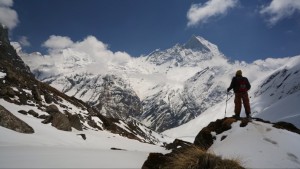
Mark’s connection with the Himalayan region began 19 years ago. His love of the mountain environments, culture and traditions, and the generosity and hospitality of the people has kept him returning to the Himalayas in Northern India, Tibet and Nepal. “I think the people of this region are pretty special… Their hearts are as big as the mountains that dominate their landscape” Mark says in the film.

Although there is poverty, there is an affluence that goes beyond material wealth. Life revolves around substance farming and there is ample food in many villages. Community and family bonds are strong, and there is a selflessness about the people that is made apparent throughout the film.
The film goes on to discuss the pre-earthquake context, how life in the village can be tough for children, and how the quality of education at government schools is generally very poor. Many schools are seriously underfunded and school attendance has been unequal across income and gender groups, due to poverty.

Mark says that if he was ever asked for money, it was usually for a donation to help out the local school. “I was thinking is there some way I could help?”
In 2011, an opportunity presented itself to help one school in Nepal that really wanted to use computers for education. So before he went to help the school, Mark and his friends registered a charity and called it the Logged On Foundation.

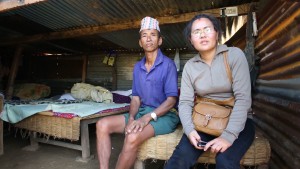
The film takes the viewer on a journey to three villages to see the damage caused to communities and listen to the concerns of teachers and parents. It shows families living in areas adjacent to their damaged homes in temporary shelters made of tin sheets and plastic tarps, and classrooms that were either seriously damaged or completely destroyed. Teachers conduct classes in tents, existing buildings that had their walls demolished, or temporary classrooms that were constructed from bamboo or salvaged timber with corrugated iron sheets for the roof.
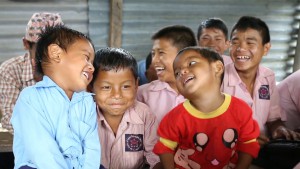
Children are distressed by the disaster and fearful of more earthquakes. But despite the destruction and hardship, they show resilience and happiness. This sentiment is contrasted with the concern parents and teachers have for the future of the children because they understand that without proper education, their future is bleak. People interviewed in the film make it clear that teaching in the current situation is difficult and the education of the children has suffered.
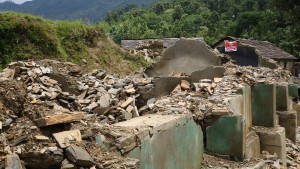

The third community visited was in the Tanahun District and here the filmmaker shows the situation at a typical family home. The scene is one where a family home was destroyed, the grandmother is unable to stand as a result of injury, and the family of 11 live in a small tin shelter.
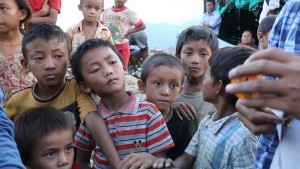

About a week after he arrived, Nepal promulgated its first Constitution after eight years of debate following the civil war. Despite opposition from some groups, for most it was a time of great celebration. But it was also the start of more social disharmony with a particular ethnic group enforcing an economic blockade at the border crossing between Nepal and India. The blockade became more economically damaging than the earthquake and delayed rebuilding efforts.

The film shows the teaching and learning conditions and at the school. The Principal and the Chairwomen of the School Management Committee describe the difficulties facing the children.
The film then takes viewers to the home of the Principal where the filmmaker resided during his time in the village. While the concerns about the economic and schooling conditions are expressed by the Principal, his son, wife and mother in interviews, they also show that their concerns are not just for their own personal needs, but also the needs of their family and the entire community.
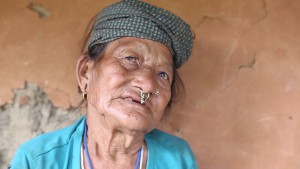
Shots around the village and home are interwoven with interviews that are not only show the routines of daily life, but suggest that the context of village life may be a key to the cultivation of the selfless qualities expressed by people throughout the film.
Back at the school Mark is asked “Why did you choose this school, to make a building or to help us?” “What can we give people who help us? You help and give suggestions to us, but we are poor, what can we give you?”
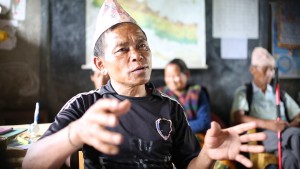
Since 2011, Mark has been sharing his enthusiasm for all things Nepal and creating pathways for travelers, adventurers, and volunteers to spend time in the villages where Logged On is working. He made three trips to Nepal in 2015 following the earthquake to oversee the assistance programs and during that time filmed and photographed the impact the disaster had on communities and the struggles they now face to provide a quality education for their children. Mark has been filming in the Himalayan region for over a decade and is now preparing another film focusing on children migrating to warmer areas of Nepal to continue their schooling during winter months. He has been passionate about photography since childhood and underwent training in ethnographic film during postgraduate studies at the Australian National University. Earth-Q is the first work Mark has produced for theatrical release. When I arrived, I quickly realised that the reality for many children is that they have fallen into a three-year educational hole that will be difficult to recover from. Imagine trying to learn in a tin-clad classroom when it’s raining, you can’t hear the teacher and the classroom floor is flooded with water. In summer it’s so hot that you have to go out of the class to cool off, or it’s so cold that holding a pencil can be a challenge. Yet despite the trauma of the disaster and the hardships endured, the children are laughing and the people are concerned for my welfare, telling me they have nothing to give me for my help except a little food and love? The making of the film was an intense and heart-wrenching journey and I have nothing but praise for the Nepali people and their resilience. I think that they are an embodiment of the human spirit to overcome adversity. I am thrilled that I was able to produce a film that not only brings attention to the serious issues faced by many Nepalese children, but highlights just how selfless, considerate and giving the people in the villages are. Earth-Q gives voice to villagers so they can share their experiences and struggles. This is their story and ours and we want to promote this film to also raise funds to help rebuild schools. We want to help get the kids out of tents and tin sheds and into a safe and child-friendly environment.
About the Director
Mark is the CEO and founder of the Logged On Foundation. His love of the Himalayan region began in 1997 and has made numerous return journeys to travel and trek in the mountains of Northern India, Tibet and Nepal. He is a social anthropologist by training, has a passion for digital technologies, and is an intrepid traveler with a commitment to philanthropy.
Director’s Notes
What a pleasure it has been to have been involved in helping communities to recover from the terrible tragedy that struck Nepal in early 2015. It was also an honour to be part of a wonderful Australian and Nepali team who worked incredibly hard side-by-side under very tight deadlines and in sometimes dangerous conditions.
